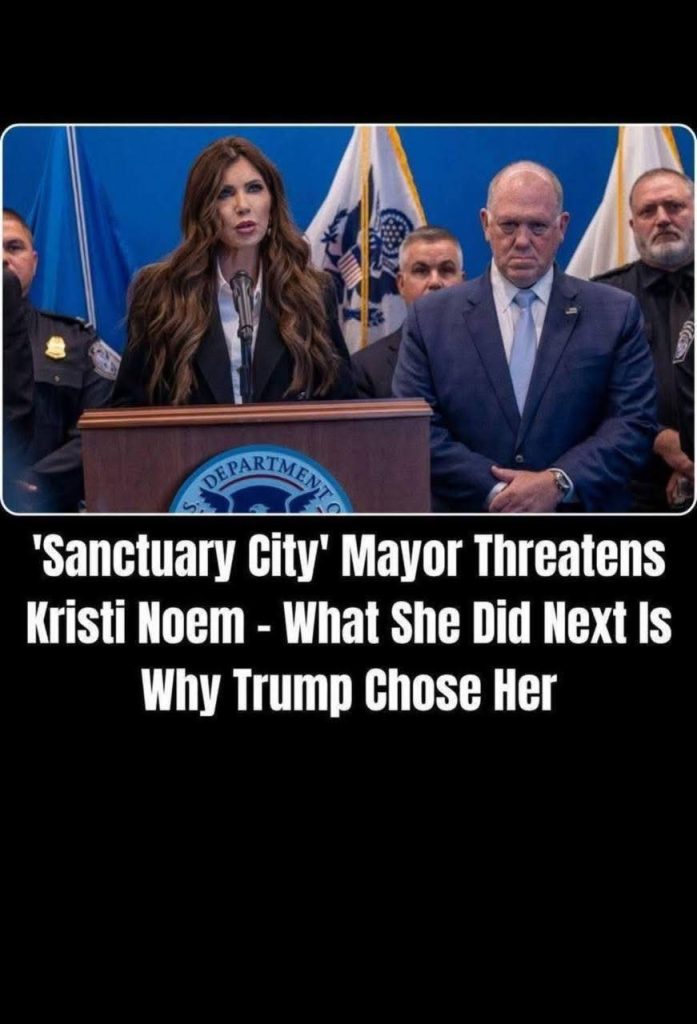In a sharp and uncompromising message that underscored the ongoing tension between federal and local governments, Homeland Security Secretary Kristi Noem issued a direct warning to Portland Mayor Keith Wilson on Tuesday. Her message was clear: if city officials continue to resist cooperation with federal security operations, Portland will see an even stronger federal presence — potentially “four times the amount” of law enforcement personnel currently on the ground.
The statement came during Noem’s visit to Portland, Oregon, where she toured the U.S. Immigration and Customs Enforcement (ICE) facility — a site that has been at the center of years of protests, vandalism, and clashes between activists and law enforcement. The visit, part of a broader push by the Trump administration to tighten control over immigration enforcement and restore law and order in historically turbulent cities, quickly evolved into a pointed confrontation between federal and local priorities.
A Clash Over Security and Sovereignty
The backdrop of the dispute is a long-running legal and political feud between Oregon state leaders and the federal government. Portland, in particular, has been emblematic of the struggle — a city that became synonymous with the 2020 riots and later a battleground for debates over local autonomy and federal intervention.
According to Noem, the city’s ongoing reluctance to cooperate with immigration enforcement and anti-riot operations has made conditions untenable for both law enforcement and the public.
“He’s continuing to play politics,” Noem told Fox News host Jesse Watters following her meeting with Mayor Wilson. “What I told him is that if he did not follow through on some of these security measures for our officers, we were going to cover him up with more federal resources — and we were going to send four times the amount of federal officers here so that the people of Portland could have some safety.”
Noem’s statement reflects a new phase in the administration’s law enforcement strategy: one that prioritizes security over local opposition. “We’ve given them chance after chance,” she said. “But the time for hesitation is over. Portland’s citizens deserve protection, and if local leaders won’t provide it, we will.”
Accusations of Political Fear and Public Risk
Standing atop the ICE facility alongside a group of federal agents and state security officials, Noem did not mince words when describing her disappointment in Portland’s leadership.
“He’s going to have blood on his hands because he sat around and thought too long,” she said of Mayor Wilson. “He’s too scared of the political ramifications of making a big decision to keep his city safe.”
Her remarks drew strong reactions both locally and nationally. Supporters applauded Noem’s willingness to challenge a city long criticized for leniency toward lawbreakers, while opponents accused her of overstepping federal authority and inflaming political tensions.
To Noem, however, the situation transcends politics. She cited multiple reports of violent incidents near the ICE building, including threats made against officers and attempts to breach security barriers. “Our officers are under siege,” she said. “And it’s not because of peaceful protest — it’s because professional agitators and criminal networks are exploiting chaos for political ends.”
The Rise of ‘Professional Terrorists’
In one of the more striking parts of her remarks, Noem described the individuals responsible for the unrest as “professional terrorists” — not disorganized protesters, but well-trained operatives with strategic goals.
“That’s my concern — you’ve got so many people here in Portland playing politics,” she said. “They don’t realize they’re up against professionals who know exactly what they’re doing.”
This echoed previous Trump administration statements, which have long alleged that extremist groups — both domestic and foreign-backed — have embedded themselves within social justice protests to attack federal facilities and undermine public order.
The Department of Homeland Security has reportedly identified several organizations coordinating demonstrations against ICE and other federal agencies across multiple cities. Noem suggested that Portland has become a “testing ground” for these groups, who are emboldened by what she described as the city’s “hands-off approach to law enforcement.”
Mayor Wilson’s Response
Mayor Wilson’s office responded cautiously to Noem’s comments, stating that while the city supports law and order, “federal overreach” was not the solution. In a brief statement, a spokesperson said, “The Mayor believes that security and community trust go hand in hand. The introduction of more federal forces without coordination or accountability risks inflaming tensions rather than resolving them.”
Privately, city officials expressed frustration with the optics of Noem’s visit, calling it a “political stunt.” One aide, speaking on condition of anonymity, told The Oregonian, “We’ve seen this playbook before. Come to Portland, make a scene about law and order, and then leave without addressing the actual causes of unrest — poverty, homelessness, and inequality.”
But those words did little to dampen Noem’s message. During her press appearance later that day, she doubled down: “They can call it a stunt all they want. What I see is a city afraid of enforcing the law.”
The Broader Context: Law and Order in 2025
Noem’s visit comes amid rising concern nationwide about urban crime, immigration enforcement, and the limits of local control. Portland, once a symbol of progressive governance, has seen its reputation falter after years of public disorder and controversial decisions to limit police funding.
The Trump administration — back in power since 2025 — has made “restoring law and order” a central pillar of its domestic agenda. Noem, who has become one of the administration’s most outspoken figures, has been tasked with leading a series of federal crackdowns on sanctuary cities and areas where local officials have resisted cooperation with federal agents.
In recent months, the Department of Homeland Security has increased the number of joint operations targeting illegal immigration, drug trafficking, and organized crime in cities across the U.S. Noem’s stance in Portland appears to be a continuation of that policy.
Reactions From Across the Political Spectrum
The move sparked predictable divisions in Washington. Republican lawmakers applauded Noem’s strong tone, calling it a “long-overdue reality check” for liberal city governments that, they argue, have neglected their basic responsibilities to protect citizens.
Sen. Josh Hawley (R-MO) praised Noem’s remarks, tweeting, “Finally, a DHS Secretary who isn’t afraid to enforce the law. Portland’s leadership has failed its people for years. Enough talk — it’s time for results.”
Democrats, meanwhile, accused the administration of turning DHS into a “political weapon.” Oregon Sen. Jeff Merkley (D-OR) condemned Noem’s comments, saying, “Federal bullying does not solve local problems. Portland doesn’t need occupation; it needs investment and partnership.”
Civil rights organizations echoed those concerns, warning that an increased federal presence could lead to unnecessary confrontations between law enforcement and protesters — similar to the infamous 2020 clashes outside the same ICE building.
A Test of Federal Power
Whether Noem follows through on her threat to quadruple the number of federal officers in Portland remains to be seen. But the warning itself signals the administration’s growing impatience with what it views as “rogue” jurisdictions defying federal mandates.
In a closing remark to reporters, Noem summed up her approach: “This isn’t about politics. It’s about protecting Americans. If mayors want to play games with public safety, that’s on them. But I will not allow an American city to become a playground for criminals and radicals.”
The message resonated with supporters who view Portland as a symbol of liberal decay — and with opponents who see it as an alarming assertion of executive power. Either way, one thing is certain: the battle between federal authority and local control in Portland is far from over.
As tensions mount, the city once again finds itself at the crossroads of ideology and governance — a place where decisions made today could redefine the balance of power between Washington and America’s cities for years to come.


